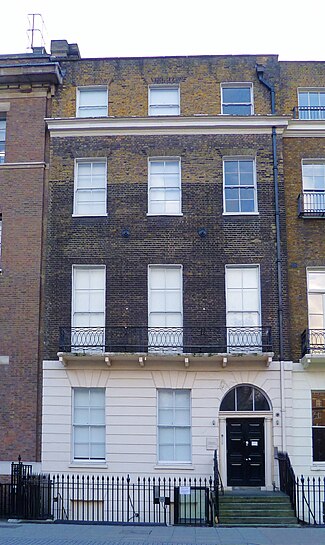Wiener Library
 |
|
| Country | United Kingdom |
|---|---|
| Established | 1933 |
| Location | 29 Russell Square London, WC1B |
| Collection | |
| Items collected | Books, pamphlets, serials, photographs, family papers, films & documentaries |
| Size | 65,000 books and pamphlets 2,000 document collections 17,000 photographs 3,000 titles of periodicals |
| Access and use | |
| Access requirements | Open to anyone |
| Other information | |
| Director | Ben Barkow (director) |
| Website | wienerlibrary.co.uk |
The Wiener Library for the Study of the Holocaust and Genocide (German pronunciation: [ˈviːnɐ ]); is the world's oldest institution devoted to the study of the Holocaust, its causes and legacies. Founded in 1933 as an information bureau that informed Jewish communities and governments worldwide about the persecution of the Jews under the Nazis, it was transformed into a research institute and public access library after the end of World War II and is now situated in Russell Square, London.
In 2017 it published an online and searchable version of the archive of the UN War Crimes Commission.
Alfred Wiener, a German Jew who worked for the Centralverein deutscher Staatsbürger jüdischen Glaubens (Central Association of German Citizens of Jewish Faith), a Jewish civil rights group, spent years documenting the rise of antisemitism. He collected books, photographs, letters, magazines and other materials, including school primers and children's games, recording the spread of Nazi propaganda and its racist doctrines.
In 1933, Wiener fled Germany for Amsterdam, where he operated the Jewish Central Information Office (JCIO). Dr. David Cohen became its president. Cohen was a prominent Dutch Jew who founded the Committee for Jewish Refugees at the same time; the Committee used the work of the JCIO for its publications, and provided some financial support to the JCIO.
After Kristallnacht in November 1938, Wiener and the JCIO archives moved to Britain. The collection opened in London on 1 September 1939, the day of the Nazi invasion of Poland. In London, the Jewish Central Information Office functioned as a private intelligence service. Wiener was paid by the British government to keep Britain informed of developments in Germany.
...
Wikipedia
